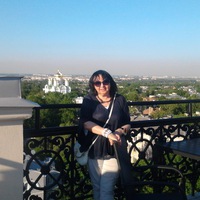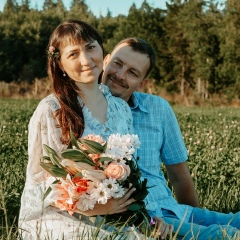Вот прожит ещё один День Победы. Прожит тихо, в Новгороде. Встреча с родными — "Бессмертный полк" — маленькое застолье — тюльпаны на огороде — несколько звонков и смс с поздравлениями, мне и от меня — кусок фильма "На всю оставшуюся жизнь" по телевизору у родителей — "Минута молчания" — рассказ отца о молодёжи, поющей "Катюшу" в автобусе, и обсуждение дерьмовости песен, сочиняемых к "Бессмертному полку" — одинокое листание праздничной ленты в соц. сетях и слушание Шульженко. Попытка что-то сформулировать и написать.
О чём? Наверно, сначала о том, что расколотость, про которую я писал два года назад, никуда не ушла. Она просто стала молчаливой. Про кого-то я теперь точно знаю: их поздравлять не надо. Про кого-то догадываюсь. На рожон не лезу. Но всё-таки больно, почему-то, просто слышать "скоро 9 мая, надо срочно куда-то уехать из города, спрятаться от всего этого".
При том что я отлично понимаю, от чего хочется прятаться. При том, что меня вчера воротило чуть не до рвоты от тех свеженьких песен, которые неслись из динамиков, когда мы в колонне "Бессмертного полка" шли через площадь (до этого несколько лет звучала какая-то одна, тоже дебильная, но к ней я, можно сказать, привык, а тут былие какие-то новые, и ещё хуже). Что ж, патриотизм у нас существует не благодаря государству, а вопреки. Так, по-моему, было и раньше. И я терплю, потому что мне важно быть здесь. Наверно, это можно назвать "смирение эстетического перед гражданским".
Сейчас время, когда прямой контакт с носителями памяти о войне заканчивается, закончился уже для большинства. Мой последний контакт прекратился в феврале 2017 (умерла бабушка) — может быть, поэтому эти последние три года я в День Победы не могу успокоиться, мне всё кажется, что я его не прожил по-настоящему, не отпраздновал. Самое страшное в уходе того поколения — не то, что больше никто не сможет рассказать как было (всё-таки, так много зафиксированных свидетельств, и документальных, и художественных), а то, что не с кем праздновать. То есть ушли те, кто был носителем не только памяти, но и праздника.
Имеет ли праздник смысл после них? Мне кажется, они бы хотели, чтоб он продолжался. Да они бы, наверно, и не поняли, в чём трудность продолжать его, пусть на доступном нам, символическом уровне, ведь всё, что для этого надо — ощущать, во имя чего была принесена та страшная юертва. Пока мы это чувствуем, у нас есть праздник подвига, без этого — только ужас перед "тупой мясорубкой".
С потерей прямого контакта начинается мучительный поиск какой-то другой связи, и естественно, что он приводит людей к ритуалу. "Бессмертный полк" сегодня — тот единственный новый ритуал, который народ принял, вернее, ухватился за него в вакууме, когда праздник в семье потерял свой стержень, и простое возложение цветов этот вакуум не восполняет. Много писали о том, какая это неидеальная акция. И я тоже вижу её недостатки. Не знаю, где как, но в Новгороде всё балансирует между теплом единения и конкретных случайных встреч в колонне, тихой, но часто праздной болтовнёй в ожидании прохода через площадь (наверно, привычка с демонстраций), самим проходом, как я уже писал, весьма мучительным (тут уже ищешь шанса спрятаться в болтовню) и движением дальше, уже совсем разрозненным. Самый сильный момент вчера — бабушки, которые смотрят на выстроившуюся колонну из окон домов на главной улице, и у одной из них в окне выставлено два портрета.
Я верю, что появятся и другие ритуалы. Это новое, что родилось у меня за вчерашний день — образ того, как мы будем отмечать День Победы в будущем. Пусть это будет не шествие, пусть мы будем собираться небольшими группами на улице, петь песни и читать стихи. Жечь костры памяти. Я не знаю, что это будет. Какое-то символическое действие, конечно, нужно. Лишь бы его посложнее было превратить в смету, объявить тендер, выделить бюджет. Отчистив этот день от истерики и бездарности официальных медиа — а также от агрессивного вмешательства других политических сил, которые бессовестно спекулируют на войне — мы, может быть, приблизимся к той общности и безусловной сердечной открытости, которые всегда отмечала моя бабушка, вспоминая военные и первые послевоенные годы. Хотя бы на один день.
p,s, Не приблизимся, конечно, нельзя приблизиться. Но, как ловили древние солнце в Стоунхендже, поймаем их отблеск.
О чём? Наверно, сначала о том, что расколотость, про которую я писал два года назад, никуда не ушла. Она просто стала молчаливой. Про кого-то я теперь точно знаю: их поздравлять не надо. Про кого-то догадываюсь. На рожон не лезу. Но всё-таки больно, почему-то, просто слышать "скоро 9 мая, надо срочно куда-то уехать из города, спрятаться от всего этого".
При том что я отлично понимаю, от чего хочется прятаться. При том, что меня вчера воротило чуть не до рвоты от тех свеженьких песен, которые неслись из динамиков, когда мы в колонне "Бессмертного полка" шли через площадь (до этого несколько лет звучала какая-то одна, тоже дебильная, но к ней я, можно сказать, привык, а тут былие какие-то новые, и ещё хуже). Что ж, патриотизм у нас существует не благодаря государству, а вопреки. Так, по-моему, было и раньше. И я терплю, потому что мне важно быть здесь. Наверно, это можно назвать "смирение эстетического перед гражданским".
Сейчас время, когда прямой контакт с носителями памяти о войне заканчивается, закончился уже для большинства. Мой последний контакт прекратился в феврале 2017 (умерла бабушка) — может быть, поэтому эти последние три года я в День Победы не могу успокоиться, мне всё кажется, что я его не прожил по-настоящему, не отпраздновал. Самое страшное в уходе того поколения — не то, что больше никто не сможет рассказать как было (всё-таки, так много зафиксированных свидетельств, и документальных, и художественных), а то, что не с кем праздновать. То есть ушли те, кто был носителем не только памяти, но и праздника.
Имеет ли праздник смысл после них? Мне кажется, они бы хотели, чтоб он продолжался. Да они бы, наверно, и не поняли, в чём трудность продолжать его, пусть на доступном нам, символическом уровне, ведь всё, что для этого надо — ощущать, во имя чего была принесена та страшная юертва. Пока мы это чувствуем, у нас есть праздник подвига, без этого — только ужас перед "тупой мясорубкой".
С потерей прямого контакта начинается мучительный поиск какой-то другой связи, и естественно, что он приводит людей к ритуалу. "Бессмертный полк" сегодня — тот единственный новый ритуал, который народ принял, вернее, ухватился за него в вакууме, когда праздник в семье потерял свой стержень, и простое возложение цветов этот вакуум не восполняет. Много писали о том, какая это неидеальная акция. И я тоже вижу её недостатки. Не знаю, где как, но в Новгороде всё балансирует между теплом единения и конкретных случайных встреч в колонне, тихой, но часто праздной болтовнёй в ожидании прохода через площадь (наверно, привычка с демонстраций), самим проходом, как я уже писал, весьма мучительным (тут уже ищешь шанса спрятаться в болтовню) и движением дальше, уже совсем разрозненным. Самый сильный момент вчера — бабушки, которые смотрят на выстроившуюся колонну из окон домов на главной улице, и у одной из них в окне выставлено два портрета.
Я верю, что появятся и другие ритуалы. Это новое, что родилось у меня за вчерашний день — образ того, как мы будем отмечать День Победы в будущем. Пусть это будет не шествие, пусть мы будем собираться небольшими группами на улице, петь песни и читать стихи. Жечь костры памяти. Я не знаю, что это будет. Какое-то символическое действие, конечно, нужно. Лишь бы его посложнее было превратить в смету, объявить тендер, выделить бюджет. Отчистив этот день от истерики и бездарности официальных медиа — а также от агрессивного вмешательства других политических сил, которые бессовестно спекулируют на войне — мы, может быть, приблизимся к той общности и безусловной сердечной открытости, которые всегда отмечала моя бабушка, вспоминая военные и первые послевоенные годы. Хотя бы на один день.
p,s, Не приблизимся, конечно, нельзя приблизиться. Но, как ловили древние солнце в Стоунхендже, поймаем их отблеск.
Another Victory Day has been lived. Lives quietly in Novgorod. Meeting with family - "Immortal Regiment" - a small feast - tulips in the garden - several calls and SMS with congratulations, me and from me - a piece of the film "For the rest of my life" on TV at my parents - "Minute of Silence" - father's story about youth singing "Katyusha" on the bus, and discussion of the shitty songs composed for the "Immortal Regiment" - a lonely paging of the holiday tape in the social. networks and listening to Shulzhenko. An attempt to formulate and write something.
About what? Probably, at first, that the split, which I wrote about two years ago, has not gone anywhere. She just became silent. Now I know for sure about someone: there is no need to congratulate them. I guess about someone. I don’t go into trouble. But it still hurts, for some reason, just to hear "May 9 is coming soon, we urgently need to leave the city somewhere, hide from all this."
Despite the fact that I perfectly understand what I want to hide from. Despite the fact that yesterday I almost turned up vomiting from those fresh songs that rushed out of the speakers when we walked across the square in the column of the Immortal Regiment (before that, for several years, some one sounded, also moronic, but I , one might say, I'm used to it, but here there were some new ones, and even worse). Well, patriotism in our country does not exist thanks to the state, but in spite of it. So, in my opinion, it was before. And I endure, because it is important for me to be here. Perhaps it can be called "the humility of the aesthetic before the civil."
Now the time when direct contact with the bearers of the memory of the war ends is over for the majority. My last contact ended in February 2017 (my grandmother died) - maybe that's why these last three years I can't calm down on Victory Day, it still seems to me that I didn't really live it, didn't celebrate. The worst thing about the departure of that generation is not that no one else will be able to tell how it was (after all, there are so many recorded testimonies, both documentary and fictional), but that there is no one to celebrate with. That is, those who were the bearers of not only memory, but also the holiday have gone.
Does the holiday make sense after them? I think they would like it to continue. Yes, they probably would not have understood what the difficulty is in continuing it, albeit at a symbolic level that is accessible to us, because all that is needed for this is to feel in the name of which that terrible yurt was brought. As long as we feel this, we have a feast of heroism, without it - only the horror of the "stupid meat grinder".
With the loss of direct contact, a painful search for some other connection begins, and it is natural that it leads people to the ritual. The "Immortal Regiment" today is the only new ritual that the people accepted, or rather, grabbed hold of it in a vacuum, when a family holiday lost its core, and a simple laying on of flowers does not fill this vacuum. They wrote a lot about what a non-ideal action it is. And I also see its flaws. I don't know where how, but in Novgorod everything balances between the warmth of unity and specific random meetings in a column, quiet but often idle chatter while waiting for a passage through the square (probably a habit from demonstrations), the very passage, as I already wrote, is very painful (here you are already looking for a chance to hide in chatter) and move on, already completely scattered. The strongest moment yesterday - the grandmothers, who are looking at the lined column from the windows of houses on the main street, and one of them has two portraits in the window.
I believe there will be other rituals as well. This is a new thing that was born to me yesterday - an image of how we will celebrate Victory Day in the future. Let it not be a procession, let us gather in small groups on the street, sing songs and read poetry. Burn bonfires of memory. I don't know what it will be. Of course, some kind of symbolic action is needed. If only it would be more difficult to turn it into an estimate, announce a tender, allocate a budget. Having cleared this day from the hysteria and mediocrity of the official media - as well as from the aggressive intervention of other political forces that shamelessly speculate in the war - we may come closer to that community and unconditional heartfelt openness that my grandmother always noted, recalling the military and the first post-war years. Just for one day.
p, s, Don't get close, of course, you can't get close. But, as the ancient sun was caught in Stonehenge, we will catch their reflection.
About what? Probably, at first, that the split, which I wrote about two years ago, has not gone anywhere. She just became silent. Now I know for sure about someone: there is no need to congratulate them. I guess about someone. I don’t go into trouble. But it still hurts, for some reason, just to hear "May 9 is coming soon, we urgently need to leave the city somewhere, hide from all this."
Despite the fact that I perfectly understand what I want to hide from. Despite the fact that yesterday I almost turned up vomiting from those fresh songs that rushed out of the speakers when we walked across the square in the column of the Immortal Regiment (before that, for several years, some one sounded, also moronic, but I , one might say, I'm used to it, but here there were some new ones, and even worse). Well, patriotism in our country does not exist thanks to the state, but in spite of it. So, in my opinion, it was before. And I endure, because it is important for me to be here. Perhaps it can be called "the humility of the aesthetic before the civil."
Now the time when direct contact with the bearers of the memory of the war ends is over for the majority. My last contact ended in February 2017 (my grandmother died) - maybe that's why these last three years I can't calm down on Victory Day, it still seems to me that I didn't really live it, didn't celebrate. The worst thing about the departure of that generation is not that no one else will be able to tell how it was (after all, there are so many recorded testimonies, both documentary and fictional), but that there is no one to celebrate with. That is, those who were the bearers of not only memory, but also the holiday have gone.
Does the holiday make sense after them? I think they would like it to continue. Yes, they probably would not have understood what the difficulty is in continuing it, albeit at a symbolic level that is accessible to us, because all that is needed for this is to feel in the name of which that terrible yurt was brought. As long as we feel this, we have a feast of heroism, without it - only the horror of the "stupid meat grinder".
With the loss of direct contact, a painful search for some other connection begins, and it is natural that it leads people to the ritual. The "Immortal Regiment" today is the only new ritual that the people accepted, or rather, grabbed hold of it in a vacuum, when a family holiday lost its core, and a simple laying on of flowers does not fill this vacuum. They wrote a lot about what a non-ideal action it is. And I also see its flaws. I don't know where how, but in Novgorod everything balances between the warmth of unity and specific random meetings in a column, quiet but often idle chatter while waiting for a passage through the square (probably a habit from demonstrations), the very passage, as I already wrote, is very painful (here you are already looking for a chance to hide in chatter) and move on, already completely scattered. The strongest moment yesterday - the grandmothers, who are looking at the lined column from the windows of houses on the main street, and one of them has two portraits in the window.
I believe there will be other rituals as well. This is a new thing that was born to me yesterday - an image of how we will celebrate Victory Day in the future. Let it not be a procession, let us gather in small groups on the street, sing songs and read poetry. Burn bonfires of memory. I don't know what it will be. Of course, some kind of symbolic action is needed. If only it would be more difficult to turn it into an estimate, announce a tender, allocate a budget. Having cleared this day from the hysteria and mediocrity of the official media - as well as from the aggressive intervention of other political forces that shamelessly speculate in the war - we may come closer to that community and unconditional heartfelt openness that my grandmother always noted, recalling the military and the first post-war years. Just for one day.
p, s, Don't get close, of course, you can't get close. But, as the ancient sun was caught in Stonehenge, we will catch their reflection.
У записи 31 лайков,
1 репостов,
360 просмотров.
1 репостов,
360 просмотров.
Эту запись оставил(а) на своей стене Илья Попов



















































